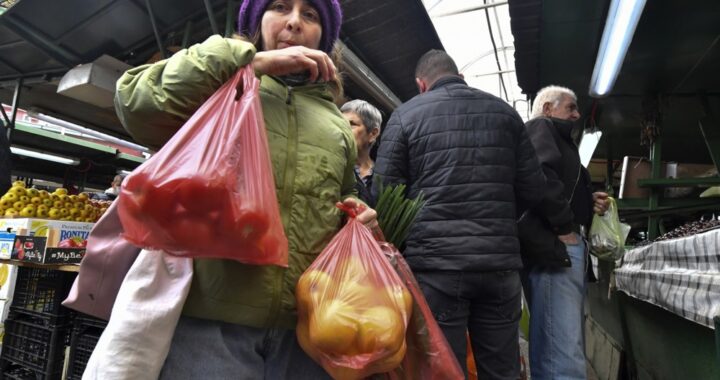

 A woman carries plastic bags with fruits and vegetables at the green market in Skopje, Republic of North Macedonia, 06 April 2023. As of 05 April 2023, North Macedonia. EPA-EFE/GEORGI LICOVSKI
A woman carries plastic bags with fruits and vegetables at the green market in Skopje, Republic of North Macedonia, 06 April 2023. As of 05 April 2023, North Macedonia. EPA-EFE/GEORGI LICOVSKI
A coalition of environmental organizations has enthusiastically welcomed the Kosovo Ministry of Infrastructure's decision to partially ban certain plastic bags and introduce a fee for others.
The environmental coalition, consisting of BIRN, D+, ACDC, and Radio Gorazdevac, has welcomed the approval of the administrative instruction that regulates the use of plastic bags in Kosovo and imposes bans on some of them.
“This marks a significant stride toward a cleaner environment and aligns with the persistent calls from civil society dedicated to environmental protection,” the coalition declared on Friday in a statement provided to Prishtina Insight.
“While this is a positive step, it should not be the endpoint. We must strive for a consistently clean environment, and competent institutions should take further measures to enhance the existing legal framework and penalize environmental violators” they added.
On Thursday, the Government of Kosovo took the decision to prohibit certain types of plastic bags and impose charges on others.
Liburn Aliu, the Minister of Environment, Spatial Planning, and Infrastructure, MESPI, made an announcement on Facebook, revealing that lightweight plastic bags with handles and thickness ranging from 0 to 25 microns, as well as oxo-degradable carrier plastic bags, are now banned.
Additionally, it is no longer permitted to display logos, trademarks, slogans, or manufacturer/seller names on lightweight plastic bags with handles that fall in the range of 25 to 50 microns.
Aliu stated, “Lightweight plastic bags with handles and a size of 25 to 50 microns must now have a mandatory minimum selling price of at least 0.05 cents, with 0.02 euros of the fee going to the budget of the Republic of Kosovo.”
He further mentioned that plastic carrying bags with a thickness exceeding 50 microns, as well as compostable biodegradable plastic bags of any size and thickness, will not have a binding minimum selling price or tax.
Aliu concluded by stating, “Until December 31, 2024, the annual usage limit for lightweight plastic carrier bags per person should not exceed 180.”
According to data from the Statistics Agency of Kosovo in 2020, the average amount of municipal waste collected per capita was 253 kilograms. In comparison, the European Commission reported that the EU’s average municipal waste per capita was 527 kg in 2021.
In the Western Balkans, Albania is the primary producer of plastic bags. Since December 2022, citizens of North Macedonia have been charged approximately 25 cents for each plastic bag. Croatia implemented a ban on such bags in January, while Montenegro and Bosnia and Herzegovina have discussed similar measures but have not made definitive decisions. In Serbia, some cities have prohibited the use of plastic bags, although there has been no national-level decision.
In July of this year, Minister Aliu stated on the show “Kallxo Përnime” that the Administrative Instruction on this issue was ready. However, he noted that the Consumer Protection Law had been delaying the implementation of this instruction.
“The Consumer Protection Law is currently in the legislative process, so we have two projects prepared, one of them being for plastic bags. Initially, plastic bags will be subject to taxation before eventually being completely banned. The project is ready, but it has been delayed due to this law,” Aliu stated in July.
08 September 2023 - 16:43

Named for its purity and as a symbol of natural beauty, the Drini i Ba...

Wildfires across Kosovo during the summer expose that the country is d...

Different Kosovo ethnic communities have joined forces in a united ef...

Kosovo’s Language Commissioner says the Ministry of Infrastructure d...